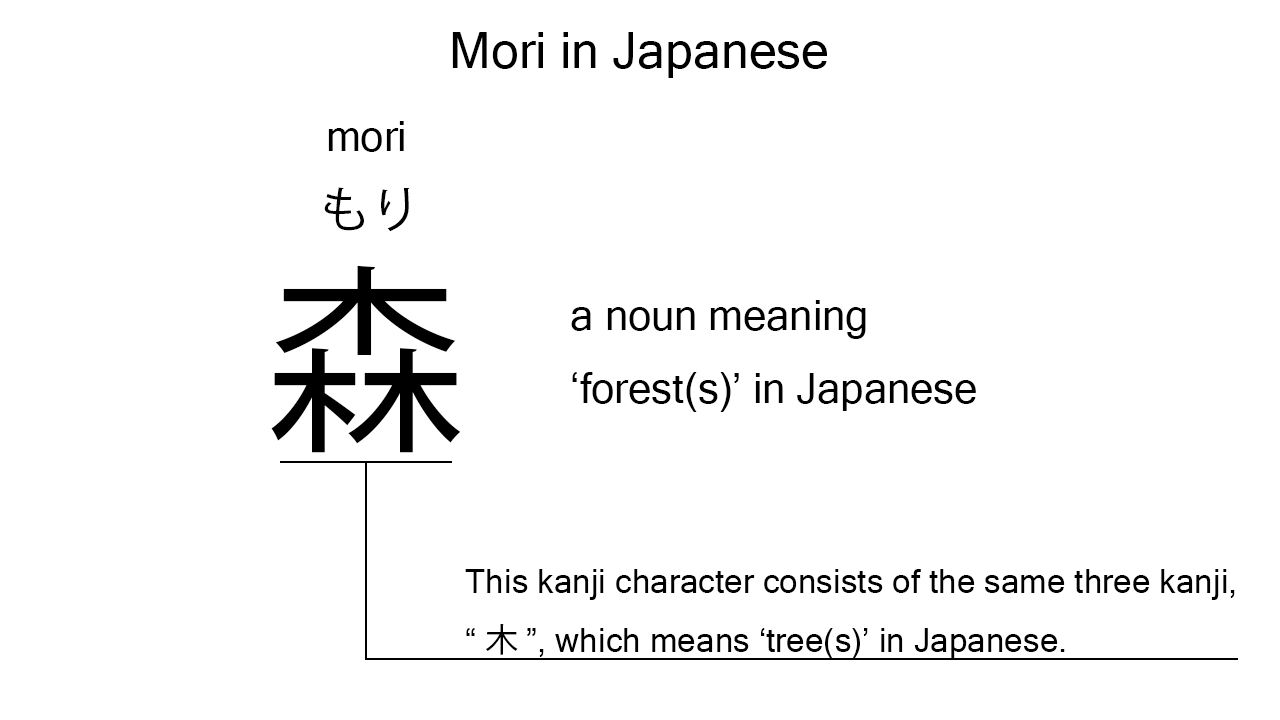What does “mori” mean in Japanese?
There are some homophones, but native speakers say “mori” normally to mean ‘forest’ in Japanese. Perhaps, some Japanese learners know this word as it is sometimes used in Japanese movies, songs, novels, manga, anime, and the like. In this blog post, however, I will explain this word in detail based on its kanji character. And also, I will explain how to use it through example sentences. My explanations would help Japanese learners understand “mori” more clearly. Then, let’s get started!
Contents
Definition and meanings of “mori”
Let me start with the definition and meanings of “mori”.
- mori – 森 (もり) : a noun meaning ‘forest’, ‘grove’, or ‘the woods’ in Japanese. This can also work as plural. Learn more about Japanese plural.
The definition and meanings are simple and clear, I think. To understand this noun more clearly, however, let me explain its kanji character in detail.
Mori in kanji
The kanji character of “mori” consists of the same three kanji:
- 木 : a kanji character used to mean ‘tree’ in Japanese.
This kanji character tells us that “forest” literally means ‘tree, tree, and tree’ in Japanese. This literal interpretation is not completely in line with the actual meanings, but still understandable, I think. A forest is often a collection of trees.

When we meet new kanji characters, we should check their parts in detail to understand their meanings clearly and deeply. In many cases, kanji parts tell us a lot about the meanings of the characters they form. Actually, here, we could get the better understanding of “mori” through the detailed check above.
So far, I’ve explained the definition and meanings of “mori” together with its kanji character. Then, let me explain how to use it through the example sentences below.
Example #1: how to say “forest” in Japanese
kinou boku tachi wa mori e it ta – 昨日僕達は森へ行った (きのうぼくたちはもりへいった)
Yesterday, we went to the forest.
Below are the new words used in the example sentence.
- kinou – 昨日 (きのう) : a noun meaning ‘yesterday’ in Japanese. This can also work as an adverb almost anywhere in a sentence. In the example, this works as an adverb at the beginning of the sentence to say “yesterday” in Japanese.
- boku – 僕 (ぼく) : a pronoun meaning ‘I’ in Japanese. This is used mainly by boys and young males.
- tachi – 達 (たち) : a suffix used after a noun or pronoun to make its plural form. In the example, this is used after “boku” to make its plural form, “boku tachi”, which means ‘we’ in Japanese.
- wa – は : a binding particle working as a case marker or topic marker. In the example, this works after “boku tachi” to make the subject in the sentence.
- e – へ : a case particle used to say where someone or something goes. In the example, this is used after “mori” to say where the speakers went yesterday.
- it – 行っ (いっ) : one conjugation of the verb, “iku“, which means ‘to go’ in Japanese. In the example, it has been conjugated for the better connection with its following word.
- ta – た : an auxiliary verb used after a verb, adjective, or auxiliary verb to make its past tense form. Probably, this is well known as a part of Japanese ta form. In the example, this is used after “it” to make its past tense form, “it ta”.
This is a typical usage of “mori”. In this example, it works together with the case particle, “e”, to become the object in the sentence. When we want to say “forest” in Japanese, anyway, this noun is a very good option.
Example #2: another usage of “mori”
boku tachi wa mori de sanpo wo shi ta – 僕達は森で散歩をした (ぼくたちはもりでさんぽをした)
We had a walk in the forest.
Below are the new words used in the example sentence.
- de – で : a case particle used to say where someone does something. In the example, this is used after “mori” to say where the speakers had a walk.
- sanpo – 散歩 (さんぽ) : a noun meaning ‘walk’ or ‘stroll’ in Japanese. This can also work as plural.
- wo – を : a case particle used to make the object word in a sentence. In the example, this is used after “sanpo” to make the object in the sentence.
- shi – し : one conjugation of the verb, “suru”, which means ‘to do’ or ‘to perform’ in Japanese. In the example, it has been conjugated for the better connection with its following word.
This is another typical usage of “mori”. In this example, it works together with the case particle, “de”, to say where the speakers had the walk. “Sanpo wo shi ta” is a commonly-used phrase which literally means ‘to have done a walk’ in Japanese. It is often translated into English as ‘to have had a walk’, though.
Summary
In this blog post, I’ve explained the definition and meanings of “mori” in detail based on its kanji character. And also, I’ve explained how to use it through the example sentences. Let me summarize them as follows.
- mori – 森 (もり) : a noun meaning ‘forest’, ‘grove’, or ‘the woods’ in Japanese. This can also work as plural. This kanji character literally means ‘tree, tree, and tree’ in Japanese. This literal interpretation is not completely in line with the actual meanings, but still understandable, I think. A forest is often a collection of trees.
Hope my explanations are understandable and helpful for Japanese learners.